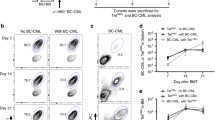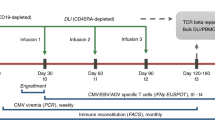Abstract
Although donor lymphocyte infusion (DLI) induces complete remissions in 70% of patients with relapsed chronic myeloid leukemia (CML) after allogeneic stem-cell transplantation (SCT), some patients are refractory to DLI by showing disease persistence. In a patient who received DLI for relapsed CML, we observed persisting molecular disease despite a hematological and cytogenetic remission in the absence of graft-versus-host disease (GVHD). To determine the nature of this immune response, we isolated leukemia-reactive donor T-cell clones from the bone marrow (BM) of the patient at the time of clinical response. Four different types of CD8+ HLA class I restricted T-cell clones were obtained that were cytotoxic against Ebstein–Barr virus-transformed B-cell lines (EBV-LCL) of the patient, but not the donor, indicating recognition of minor histocompatibility antigens (mHags). By using survival studies with CFSE labelled BM cells populations, a hematopoietic progenitor cell inhibition assay and direct morphological examination we showed that the T-cell clones recognized mature monocytic and myeloid cells, whereas immature BM progenitor cells were insufficiently lysed. This patient's refractoriness for DLI appears to be caused by inadequate lysis of progenitor cells by these cytotoxic T cells. These findings support the hypothesis that for eradication of CML a cytotoxic T-cell response against leukemic progenitor cells is essential.
This is a preview of subscription content, access via your institution
Access options
Subscribe to this journal
Receive 12 print issues and online access
$259.00 per year
only $21.58 per issue
Buy this article
- Purchase on Springer Link
- Instant access to full article PDF
Prices may be subject to local taxes which are calculated during checkout





Similar content being viewed by others
References
Thomas ED, Clift RA, Fefer A, Appelbaum FR, Beatty P, Bensinger WI et al. Marrow transplantation for the treatment of chronic myelogenous leukemia. Ann Intern Med 1986; 104: 155–163.
Goldman JM, Gale RP, Horowitz MM, Biggs JC, Champlin RE, Gluckman E et al. Bone marrow transplantation for chronic myelogenous leukemia in chronic-phase. Increased risk for relapse associated with T-cell depletion. Ann Intern Med 1988; 108: 806–814.
Kolb HJ, Mittermuller J, Clemm C, Holler E, Ledderose G, Brehm G et al. Donor leukocyte transfusions for treatment of recurrent chronic myelogenous leukemia in marrow transplant patients. Blood 1990; 76: 2462–2465.
Riddell SR, Berger C, Murata M, Randolph S, Warren EH . The graft versus leukemia response after allogeneic hematopoietic stem cell transplantation. Blood Rev 2003; 17: 153–162.
Falkenburg JH, van de Corput L, Marijt EW, Willemze R . Minor histocompatibility antigens in human stem cell transplantation. Exp Hematol 2003; 31: 743–751.
Wang W, Meadows LR, den Haan JM, Sherman NE, Chen Y, Blokland E et al. Human H-Y: a male-specific histocompatibility antigen derived from the SMCY protein. Science 1995; 269: 1588–1590.
Meadows L, Wang W, den Haan JM, Blokland E, Reinhardus C, Drijfhout JW et al. The HLA-A*0201-restricted H-Y antigen contains a posttranslationally modified cysteine that significantly affects T cell recognition. Immunity 1997; 6: 273–281.
Pierce RA, Field ED, den Haan JM, Caldwell JA, White FM, Marto JA et al. Cutting edge: the HLA-A*0101-restricted HY minor histocompatibility antigen originates from DFFRY and contains a cysteinylated cysteine residue as identified by a novel mass spectrometric technique. J Immunol 1999; 163: 6360–6364.
Vogt MH, de Paus RA, Voogt PJ, Willemze R, Falkenburg JH . DFFRY codes for a new human male-specific minor transplantation antigen involved in bone marrow graft rejection. Blood 2000; 95: 1100–1105.
Vogt MH, Goulmy E, Kloosterboer FM, Blokland E, de Paus RA, Willemze R et al. UTY gene codes for an HLA-B60-restricted human male-specific minor histocompatibility antigen involved in stem cell graft rejection: characterization of the critical polymorphic amino acid residues for T-cell recognition. Blood 2000; 96: 3126–3132.
Warren EH, Gavin MA, Simpson E, Chandler P, Page DC, Disteche C et al. The human UTY gene encodes a novel HLA-B8-restricted H-Y antigen. J Immunol 2000; 164: 2807–2814.
Brickner AG, Warren EH, Caldwell JA, Akatsuka Y, Golovina TN, Zarling AL et al. The immunogenicity of a new human minor histocompatibility antigen results from differential antigen processing. J Exp Med 2001; 193: 195–206.
Vogt MH, van den Muijsenberg JW, Goulmy E, Spierings E, Kluck P, Kester MG et al. The DBY gene codes for an HLA-DQ5-restricted human male-specific minor histocompatibility antigen involved in graft-versus-host disease. Blood 2002; 99: 3027–3032.
Spierings E, Brickner AG, Caldwell JA, Zegveld S, Tatsis N, Blokland E et al. The minor histocompatibility antigen HA-3 arises from differential proteasome-mediated cleavage of the lymphoid blast crisis (Lbc) oncoprotein. Blood 2003; 102: 621–629.
Murata M, Warren EH, Riddell SR . A human minor histocompatibility antigen resulting from differential expression due to a gene deletion. J Exp Med 2003; 197: 1279–1289.
Torikai H, Akatsuka Y, Miyazaki M, Warren EH, Oba T, Tsujimura K et al. A novel HLA-A*3303-restricted minor histocompatibility antigen encoded by an unconventional open reading frame of human TMSB4Y gene. J Immunol 2004; 173: 7046–7054.
den Haan JM, Meadows LM, Wang W, Pool J, Blokland E, Bishop TL et al. The minor histocompatibility antigen HA-1: a diallelic gene with a single amino acid polymorphism. Science 1998; 279: 1054–1057.
den Haan JM, Sherman NE, Blokland E, Huczko E, Koning F, Drijfhout JW et al. Identification of a graft versus host disease-associated human minor histocompatibility antigen. Science 1995; 268: 1476–1480.
Akatsuka Y, Nishida T, Kondo E, Miyazaki M, Taji H, Iida H et al. Identification of a polymorphic gene, BCL2A1, encoding two novel hematopoietic lineage-specific minor histocompatibility antigens. J Exp Med 2003; 197: 1489–1500.
Dolstra H, Fredrix H, Maas F, Coulie PG, Brasseur F, Mensink E et al. A human minor histocompatibility antigen specific for B cell acute lymphoblastic leukaemia. J Exp Med 1999; 189: 301–308.
Kloosterboer FM, van Luxemburg-Heijs SA, van Soest RA, Barbui AM, van Egmond HM, Strijbosch MP et al. Direct cloning of leukaemia-reactive T-cells from patients treated with donor lymphocyte infusion shows a relative dominance of hematopoiesis-restricted minor histocompatibility antigen HA-1 and HA-2 specific T-cells. Leukemia 2004; 18: 798–808.
Faber LM, Luxemburg-Heijs SA, Willemze R, Falkenburg JH . Generation of leukemia-reactive cytotoxic T lymphocyte clones from the HLA-identical bone marrow donor of a patient with leukaemia. J Exp Med 1992; 176: 1283–1289.
Jedema I, van der Werff NM, Barge RM, Willemze R, Falkenburg JH . New CFSE-based assay to determine susceptibility to lysis by cytotoxic T cells of leukemic precursor cells within a heterogenous target cell population. Blood 2004; 103: 2677–2682.
Smit WM, Rijnbeek M, van Bergen CA, Fibbe WE, Willemze R, Falkenburg JH . T cells recognizing leukemic CD34(+) progenitor cells mediate the antileukemic effect of donor lymphocyte infusions for relapsed chronic myeloid leukemia after allogeneic stem cell transplantation. Proc Natl Acad Sci USA 1998; 95: 10152–10157.
van der Hoorn MA, van Luxemburg-Heijs SA, van Bergen CA, Bongaerts R, Willemze R, Falkenburg JH . The progenitor cell inhibition assay to measure the anti-leukemic reactivity of T cell clones against acute and chronic myeloid leukemia. Methods 2003; 31: 113–119.
Kloosterboer FM, van Luxemburg-Heijs SA, van Soest RA, van Egmond HM, Barbui AM, Strijbosch MP et al. Minor histocompatibility antigen-specific T cells with multiple distinct specificities can be isolated by direct cloning of IFN-secreting T cells from patients with relapsed leukemia responding to donor lymphocyte infusion. Leukemia 2005; 19: 83–90.
Marijt WA, Heemskerk MH, Kloosterboer FM, Goulmy E, Kester MG, van der Hoorn MA et al. Hematopoiesis-restricted minor histocompatibility antigens HA-1- or HA-2-specific T cells can induce complete remissions of relapsed leukemia. Proc Natl Acad Sci USA 2003; 100: 2742–2747.
Bonnet D, Dick JE . Human acute myeloid leukaemia is organized as a hierarchy that originates from a primitive hematopoietic cell. Nat Med 1997; 3: 730–737.
Reya T, Morrisson SJ, Clarke MF, Weissmann IL . Stem cells, cancer and cancer stem cells. Nature 2001; 414: 105–111.
Acknowledgements
We thank R van der Linden and M van der Keur for expert technical assistance with the flow cytometric isolation. Grant support was provided by the EU sixth framework program Integrated project Allostem (503319).
Author information
Authors and Affiliations
Corresponding author
Rights and permissions
About this article
Cite this article
von dem Borne, P., van Luxemburg-Heijs, S., Heemskerk, M. et al. Molecular persistence of chronic myeloid leukemia caused by donor T cells specific for lineage-restricted maturation antigens not recognizing immature progenitor-cells. Leukemia 20, 1040–1046 (2006). https://doi.org/10.1038/sj.leu.2404169
Received:
Revised:
Accepted:
Published:
Issue Date:
DOI: https://doi.org/10.1038/sj.leu.2404169



